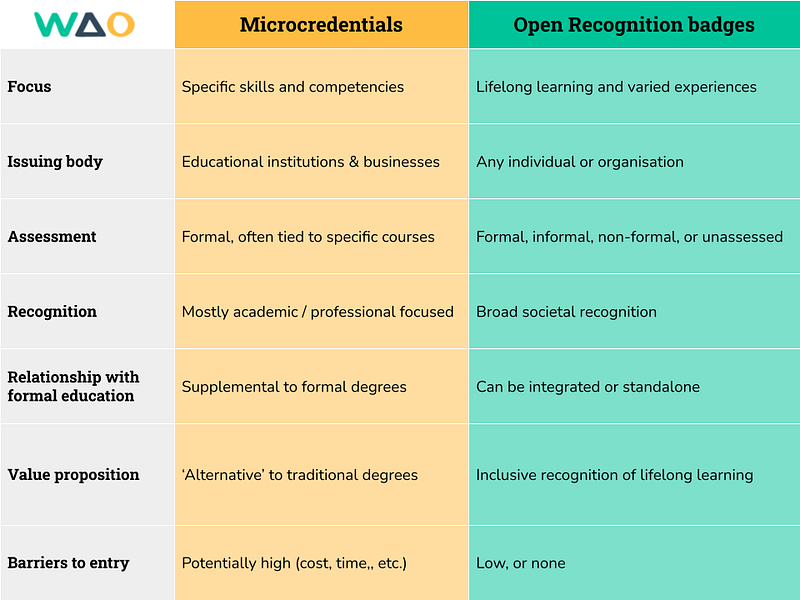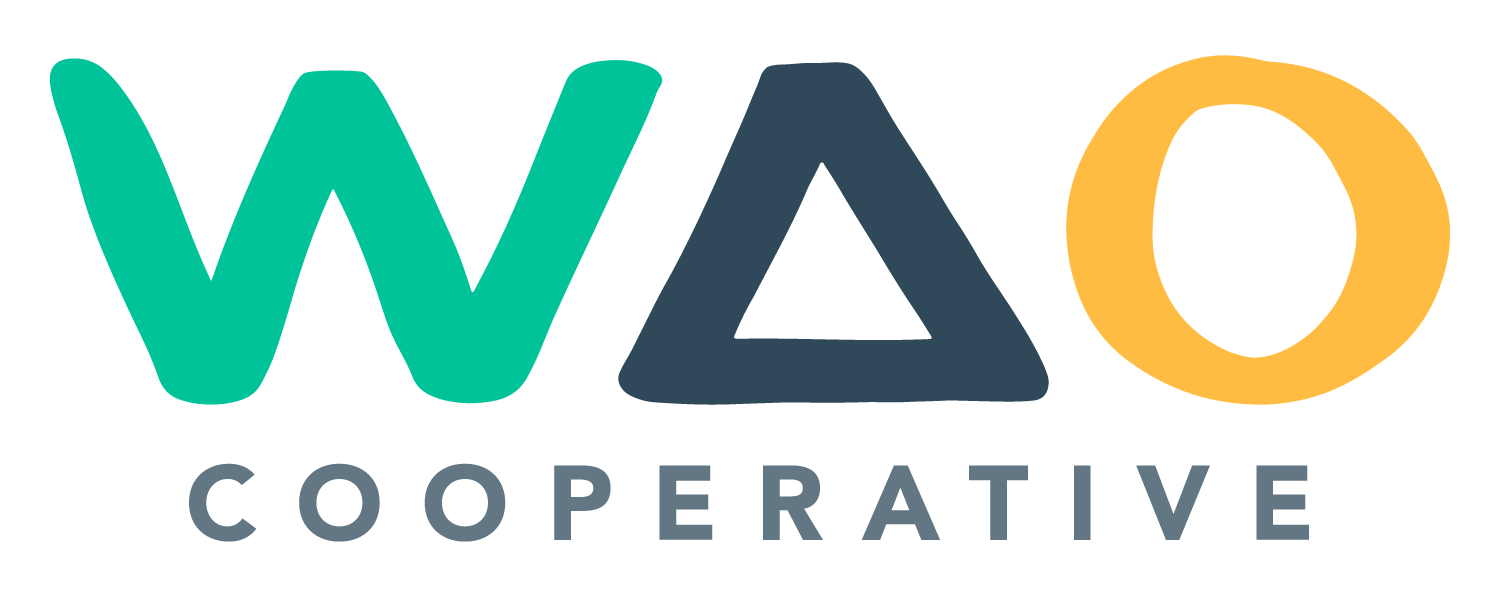Open Recognition: Towards a Practical Utopia
Exploring the Future of Work and Learning

Imagine a world where everyone has an equitable opportunity to showcase their skills and be recognised for them, regardless of whether or not they have a formal degree. A world where gatekeepers no longer control the keys, where learning and skills development are a natural part of life, and where recognition of these skills is open and transparent. This is the realm of Open Recognition, a realm we would describe as a ‘practical utopia’.
In this utopia, universities and other institutions still play a role, but they are no longer the sole arbiters of who is ‘skilled’ and who is not. They are nodes in a broad ecosystem of learning and recognition that includes employers, co-ops, communities, and self-directed learners. The power of recognition has been democratically distributed, with every individual having an active stake in it.
Learning, in this world, has been ‘rewilded’. It happens everywhere, all the time, fuelled by curiosity and the desire to improve rather than the mechanical necessity of earning a degree. Workplaces are transformed into vibrant learning hubs, with employees being recognised for the skills they develop on the job. Communities are engaged in recognising the skills and contributions of their members, fostering a culture of mutual support and lifelong learning.
The Limits of Microcredentialing
There’s been a huge growth in interest around microcredentialing in the last few years as an approach offering distinct, focused qualifications. It’s great for ‘brands’. It’s certainly useful to start reimagining what’s possible, especially when coupled with national incremental credentialing initiatives. However, the trend aligns with the neoliberal view of education as another ‘marketplace’. Students, due to high fees and a need for job security, increasingly resemble customers. Those who can’t pay are crowded out.
Microcredentials are usually based upon a standard known as Open Badges. The original dream for this standard was to solve the problem that lifelong learning happens everywhere, and but isn’t always recognised. Microcredentials tend to solve a subset of this, on students getting a ‘return on investment’ for their tuition fees by securing decent employment upon graduation. Inevitably, this has led universities to form partnerships with employers and incorporate microcredentials into their educational offerings.
Helping people into employment is an important thing to do. Microcredentials are indeed integral elements of the emerging new learning ecosystem, providing a flexible means for individuals to demonstrate their competencies. But they are not the only pieces in play. In our practical utopia, recognition is diverse and multifaceted, taking various forms from community awards, peer recognition, to self-assessment and reflection.
What happens if, instead of dividing the boxes of credentials into ever-smaller boxes of microcredentials, we… get rid of most of the boxes altogether?

Open Recognition is a Better Lens
Open Recognition offers an alternative that could potentially disrupt the educational status quo. It’s an approach that facilitates recognition of lifelong learning and development, extending opportunities beyond the confines of traditional education.
“Open Recognition is the awareness and appreciation of talents, skills and aspirations in ways that go beyond credentialing. This includes recognising the rights of individuals, communities, and territories to apply their own labels and definitions. Their frameworks may be emergent and/or implicit.” (definition)
In recent years, our understanding of diversity has expanded significantly. We recognise and celebrate differences in ethnicity, neurodiversity, gender, as well as abilities and experiences. This broadened conception of diversity has enriched our communities and workplaces, leading to greater inclusivity and understanding. It’s high time we applied this expansive view of diversity to the recognition of learning and work.
We need to acknowledge the myriad ways in which people learn and the diverse skills they bring to their work. A person’s value should not be measured solely by their degrees or formal qualifications, but also by their unique abilities, experiences, and contributions. Open Recognition invites us to embrace this diversity, allowing everyone’s learning journey to be seen, appreciated, and valued. This is a key step towards a more equitable and inclusive society, where everyone has the opportunity to thrive.
When we apply McLuhan’s tetrads to Open Recognition, we gain insightful perspectives into its potential societal and educational impacts. This approach looks at what is enhanced, retrieved, obsolesced, and reversed due to an innovation.
- Enhances: Open Recognition enhances the visibility and accessibility of skills and achievements. It amplifies the ability of individuals to showcase their talents and competences in a way that’s verifiable and portable across different platforms and communities.
- Retrieves: Open Recognition retrieves the concept of peer-to-peer validation and communal acknowledgement of skills and achievements, similar to how guilds or apprenticeships operated in the past. It also revives the importance of informal and experiential learning, as these forms of learning can now be recognised and valued alongside formal education.
- Obsolesces: Open Recognition could potentially render obsolete traditional, centralised systems of recognition and accreditation. For example, it might diminish the importance of formal degrees or certificates issued by educational institutions, as people can now receive recognition from various sources and in various forms.
- Reverses: If pushed to its limits, Open Recognition might flip into a situation where traditional forms of accreditation are disregarded or devalued. If the recognition landscape becomes fragmented or chaotic, the value and reliability of recognition could be diluted. It might become more challenging to discern the validity and worth of various forms of recognition, and this would likely make it difficult to ensure that people have the necessary skills for particular job roles.
The transition to Open Recognition carries profound implications for individuals and society. It eliminates barriers to entry for many jobs, fostering a more diverse and inclusive workforce. It encourages individuals to follow their passions and interests, rather than being herded into a narrow set of ‘approved’ careers. It acknowledges that learning is a lifelong endeavour, recognising that everyone has valuable skills and knowledge to contribute. While there are certainly some challenges that come with such a recognition utopia, the ultimate goal is a world in which people contribute to society in ways that are both meaningful and healthy.
It’s important to note that we are not against microcredentials. WAO hasn’t created the Keep Badges Weird community and evolved it into Open Recognition is for Everybody merely so that we can critique institutions. Our members are products of these institutions, with multiple degrees to prove it. We’ve worked with many institutions since our founding seven years ago, and we see value in alternative credentialing.
Instead, we are advocating for a society where institutions form just one part of a broader, more diverse ecosystem. We support the idea that young people should be able to access the workforce and secure decent jobs without being entirely dependent on traditional educational institutions. Not everybody has the same access to the institutions that shape our society, which is why society isn’t shaped in a way that benefits all of us. We need to rewild work and learning to give more people the ability to participate in society.

Conclusion
Open Recognition requires a substantial shift in mindset, a transition from viewing education as a commodity to be consumed, to understanding it as a process to be engaged with. It demands us to challenge the status quo, to question the authority of gatekeepers, and to establish new, open systems of recognition.
The rewards of this transition, however, are immense. A world where everyone’s skills and knowledge are recognised and valued is a world of greater equality, opportunity, and fulfilment. It’s a world where work and learning are inextricably intertwined, a world where we are all simultaneously teachers and learners, and a world where the journey of discovery is unending. This is the world we envisage with Open Recognition, and it’s a world worth striving for.
Why not join a community discussing these ideas? Head on over to badges.community!

Co-written with Laura Hilliger

Discussion